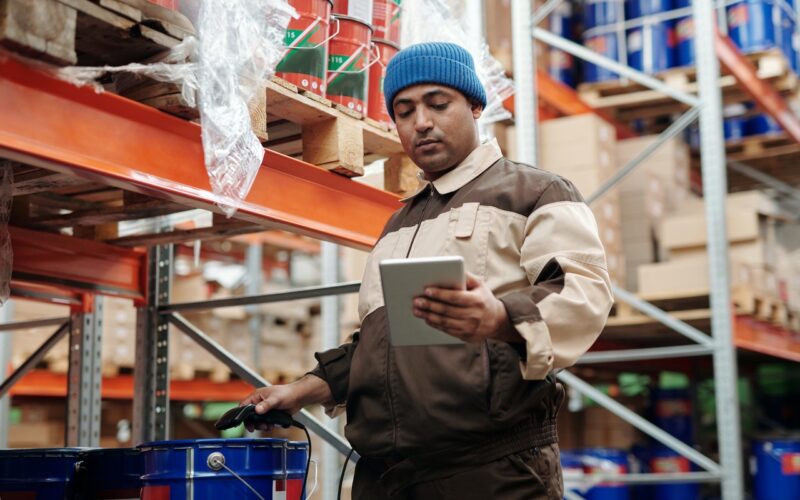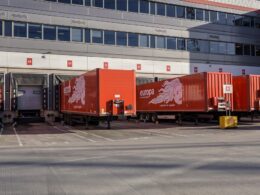We all use AI every day. It predicts the text when you’re typing a message on your phone, finds the best route on your GPS, and makes delivering packages with drones possible. As we all know, it found its way into the logistics industry as well, and we’re sure glad it did. However, is the revolution of the world of logistics really happening in front of our eyes? As we see it, the best way to answer this question is by looking at the top benefits of AI in logistics.
In essence, all AI solutions are there to help you increase the efficiency of processes, reduce delays, and lower costs. And they’re doing that very well — however, the difference is in how they do it. And that’s what you should pay attention to if you want to prepare for industry 4.0.
The idea is to look beyond the benefits and figure out how different solutions work. Once you do that, you’ll get a sense of what changes you’ll need to make within your value chain and how the technology can make them for the better. Here are the things we feel bring the most value.
Improved Transportation Forecasting
For many logistic managers, transportation forecasting software is a gift they’ve been dreaming about. The algorithm will calculate your future shipping capacity needs, possible cost fluctuations, and available transport capacity. No longer do you have to spend hours with a pen and paper thinking about how to get hold of enough shipping companies to send out all those orders you’ve got.
The way it works is rather simple. The software will collect huge chunks of market data from every touchpoint available, and it’ll analyse them to give you an estimate of when and how many goods you’ll need to ship. It gives you a chance to reserve your capacity in advance, so you’ll get it at a lower price.
Without the software, you have no more than a few days after you get an order to find the transportation option for it. And if you didn’t reserve any capacity, you might be stuck with paying premium freight prices or end up shut out from the carriers altogether. That’s the scenario you want to avoid, by all means.
Better Quality of Data
In the world we live in, data is everything. For example, if you have a CRM system to keep track of your customers, you want to have as much information about them as possible. It makes your job of helping them easier, so it works out for everyone. But, as we can see from the trends, CRM technology changes as well. It’s no longer just about the amount of data you have but also about the quality of it. And the story is pretty much the same as what we have in logistics — you need quality data to make use of it.
Luckily, AI is very good at collecting and sorting out data. If you feed it with enough information, it won’t have any problems telling you how to avoid risks, maximize resources, and bring your costs down. It can go as far as telling you how many people and assets you’ll need, where you’ll need them, and for how long. You’ll be able to refine your operations on a day-to-day basis — just by listening to software.
However, to enjoy the benefits of AI in logistics, you’ll have to achieve a high level of AI integration within your chain. You still have to have a lot of touchpoints for the software to give you a good analysis.
Optimized Fleet Performance
Two years ago, it would cost you about $3,000 to ship a 40-foot container from China to the US. However, in 2021, this price was closer to $20,000. It’s a substantial increase, so it’s a good idea for logistics companies to rethink their assets’ positioning.
An AI analysis can give you insights into how your fleet performs and help your planners decide on where to position your assets to stay away from risks. It’ll point out all the errors in your planning, and you’ll get a chance to develop better routes. You’ll reduce the empty container transport and possibly even lower the number of vehicles on the road.
Although driver shortage is showing signs of improvement, the situation is far from ideal. You still need to pay attention to where your trucks are and direct them towards the locations where you’re expecting demand. AI helps you position your assets properly, which leads to high efficiency and lower operating costs.
Increased Space Efficiency
All the things we mentioned until now were about the big picture. And it makes sense: improving large operations will bring you the most benefits. However, smaller operations like packing goods into a container still make a big part of the job. And if you get them wrong, it can mess up the whole process that succeeds them.
Fortunately, AI can help you here, as well. When you need to make a quick decision about packing goods in the warehouse or a container, metaheuristic algorithms are the ideal solution. In this scenario, you’re faced with pretty much infinite options, so you need one that will be good enough.
The software will calculate the most reasonable way to do it much faster and better than a human would. The higher volume your shipments are, the more benefits you’ll see. You’ll need fewer containers, so your costs will drop.
Optimized Last Mile Planning
In the last couple of years, we’ve seen a big boom in the last-mile transportation segment. More and more people are shopping online, and they want their products delivered to their doorstep. So eCommerce growth will continue to accelerate, and to stay on top of everything, logistics companies need to utilize AI to streamline their operations.
The software will take the shipment data, user requirements, and company constraints into consideration, and it will help you find a way to optimize your fleet. It’ll allow you to avoid roadblocks and stay efficient in the last mile of transport. Your customers will get a timely delivery, and you won’t lose any time or money due to bad planning.
Conclusion
These are the top benefits of AI in logistics, as we see it. On the other hand, the technology is still developing, and we’re only at the beginning of extensive AI use. So, the bottom line for today is to get on board with these new trends as soon as possible. The more you wait, the less competitive you’ll become, and the bigger gap you’ll have to jump over in the future. It’s the future — embrace it.













